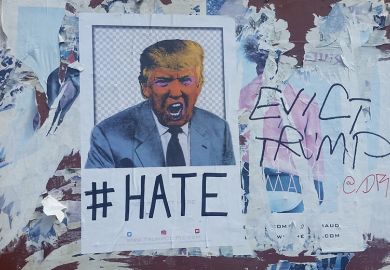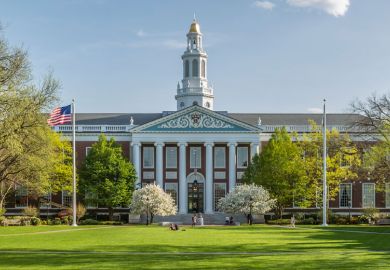The attack on the Capitol by a mob of Donald Trump supporters carrying Confederate flags and neo-Nazi insignia demonstrated that US universities are falling far short of meeting the need to improve social understanding in the country, a university president has said.
In the wake of the riot, a parade of higher education leaders let loose with vows to encourage dialogue, uphold values and reject ignorance and hatred.
But Patricia McGuire, president of Trinity Washington University, suggested that her peers were so constrained by the need to cultivate politicians and donors that they failed to publicly challenge anything but the most egregious behaviour by public figures and did too little to press their institutions to produce well-rounded conscientious members of society.
“There is no [Theodore] Hesburgh, there is no Derek Bok any more,” Ms McGuire told Times Higher Education, referencing two legendary past presidents of the University of Notre Dame and Harvard University.
Instead, Ms McGuire said, there are presidents such as Amy Gutmann at the University of Pennsylvania, whose post-riot statement bemoaning “threatening incitements and assaults on the political freedom of all citizens” sidestepped the name of Mr Trump, a Penn graduate.
Other graduates of elite institutions whom Ms McGuire cited as leading Mr Trump’s assault on objective fact and humane civility, while managing to avoid direct castigation from their alma maters, include US senators Ted Cruz and Josh Hawley, and White House adviser Stephen Miller. Mr Miller, in particular, has been described as having had his attitudes on race issues refined rather than confronted at Duke University.
“The number of elite college graduates who have perpetrated the fake news of the election lies is stunning,” Ms McGuire said.
To the degree that university students do face general education requirements, Ms McGuire said, approaches tended to affirm and reinforce the attitudes students bring to their classes. The point of teaching Aristotle and Plato, she said, should be to teach students “how to question, how to evaluate evidence, how to make a moral judgement that maybe goes against what the power structure wants you to do”.
Other academics agreed that US universities needed to redouble their efforts to overcome the US’ violent history of racial division. Lawrence Glickman, a professor of American studies at Cornell University, said there was particular value at this moment in better understanding the Civil War. “While there are no simple historical precedents” for what the US was now experiencing, Professor Glickman said, “it does strike me that the Reconstruction era [following the Civil War] is key.”
Instead of floating such ideas, said Arie Kruglanski, a professor of psychology at the University of Maryland, the responses of university presidents appeared bound up in anger and blame. This seemed far less effective than making a greater strategic effort to understand the motivations of the Capitol mob and the millions of Americans understood through polling to have backed it, said Professor Kruglanski, an expert in political radicalisation and terrorism.
Many such people believed that their confrontational behaviour was a reasonable response to the loss of dignity they felt in modern society, Professor Kruglanski said. Political leaders and educators needed to find better ways of bringing such people, from very young ages, into direct and sustained contact with people who are different from them.
But David Hofmann, an associate professor of sociology at the University of New Brunswick and an expert in anti-government movements, cautioned that the racial problem in the US appeared unique to the nation’s interconnected history of slavery and guns.
“I don’t see this changing – it’s part of American culture, for good or for ill,” Dr Hofmann said. “I’m not sure that universities can do much about it, barring some sort of revolution.”
Register to continue
Why register?
- Registration is free and only takes a moment
- Once registered, you can read 3 articles a month
- Sign up for our newsletter
Subscribe
Or subscribe for unlimited access to:
- Unlimited access to news, views, insights & reviews
- Digital editions
- Digital access to THE’s university and college rankings analysis
Already registered or a current subscriber?








